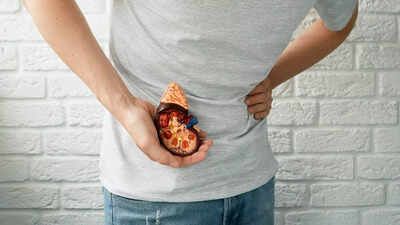ARTICLES
Kidney Stones and Your Diet: 10 Foods to Avoid and 10 That Help Prevent Them
Kidney Stones and Your Diet: 10 Foods to Avoid and 10 That Help Prevent Them

Kidney stones are a painful and increasingly common health issue that affects millions around the world. While genetics, hydration, and certain medical conditions can contribute to their formation, your diet plays a major role—both in causing and preventing these mineral deposits.
In this article, we break down how kidney stones form, the most common types, and highlight 10 foods that may increase your risk—as well as 10 foods that can help prevent them.
What Are Kidney Stones?
Kidney stones, also known as renal calculi, are solid masses made up of tiny crystals. These stones form when your urine contains high levels of minerals like calcium, oxalate, or uric acid, and not enough fluid to dilute them. Over time, these substances bind together and form stones that can cause intense pain as they move through the urinary tract.
Symptoms of Kidney Stones Include:
- Severe pain in the lower back, abdomen, or groin
- Blood in the urine
- Nausea or vomiting
- Frequent or painful urination
- Cloudy or foul-smelling urine
If left untreated, kidney stones can lead to complications such as infections or even kidney damage.
Common Types of Kidney Stones
- Calcium Oxalate Stones – The most prevalent type, often linked to diets high in oxalates and calcium.
- Uric Acid Stones – Associated with high intake of purines found in red meat and organ meats.
- Struvite Stones – Typically develop after urinary tract infections.
- Calcium Phosphate Stones – Often due to high urinary pH or metabolic disorders.
- Cystine Stones – A rare genetic condition causing excessive cystine in the urine.
How Diet Influences Kidney Stone Formation
A diet high in sodium, sugar, animal proteins, and oxalate-rich foods can increase your risk. On the flip side, staying well-hydrated and consuming certain fruits, vegetables, and whole grains can reduce the likelihood of stones forming.
10 Foods That May Trigger Kidney Stones
- Spinach – High in oxalates, which can bind with calcium and form stones.
- Beets – Another oxalate-rich food that can raise stone risk when consumed in large amounts.
- Nuts and Nut Butters – Almonds, peanuts, and cashews are nutritious but contain significant oxalates.
- Chocolate – Especially dark chocolate; rich in oxalates.
- Black Tea – A major source of dietary oxalates, especially problematic in large quantities.
- Red Meat – High purine content can increase uric acid levels, leading to uric acid stones.
- Salt (Sodium) – Excessive sodium promotes calcium buildup in the urine.
- Cola Drinks – Contain phosphoric acid, which may increase urinary acidity and stone risk.
- Processed Foods – Often high in sodium and preservatives that stress kidney function.
- Rhubarb – Contains very high levels of oxalates and is best avoided by those prone to stones.
10 Foods That Help Prevent Kidney Stones
- Water – The most effective preventive measure. Aim for 2–3 liters a day.
- Citrus Fruits – Lemons, limes, and oranges are high in citrate, which binds to calcium in urine and reduces stone formation.
- Calcium-Rich Foods – Dairy sources like milk, cheese, and yogurt help prevent oxalate absorption in the gut.
- Bananas – Low in oxalates and high in potassium, supporting kidney function.
- Barley Water – A natural diuretic that may help flush the kidneys.
- Cucumbers – Hydrating and low in oxalates, great for diluting urine.
- Whole Grains – Oats, brown rice, and barley are good sources of magnesium, which helps prevent crystal formation.
- Basil Leaves – Known in traditional medicine to support kidney health and reduce uric acid.
- Watermelon – High in water and potassium, promotes kidney detoxification.
- Pomegranate – Antioxidant-rich and beneficial for urinary tract health.
Additional Kidney Stone Prevention Tips
- Avoid excessive vitamin C supplements, which convert into oxalates.
- Get calcium through food, not supplements, unless advised by a doctor.
- Limit animal protein intake.
- Stay physically active to support overall kidney health.
- Monitor urine pH levels if you’ve had stones before.
When to Seek Medical Help
If you experience any of the following symptoms, consult a doctor immediately:
- Severe back or abdominal pain
- Blood in urine
- Fever and chills
- Persistent nausea or vomiting
Diagnosis and Treatment: Imaging tests such as ultrasound or CT scans can confirm kidney stones. Treatments may include hydration, medication, shockwave therapy (lithotripsy), or minor surgical procedures.

 NEWS16 hours ago
NEWS16 hours agoFG makes tax identification mandatory for banking, allied services

 EDUCATION19 hours ago
EDUCATION19 hours agoSSANU threatens strike over unmet welfare demands

 EDUCATION16 hours ago
EDUCATION16 hours agoParents in Jigawa Express Concerns Over Rising Education Costs as Schools Resume

 ARTICLES16 hours ago
ARTICLES16 hours ago6 Things You Must Know Before Starting Your Investment Journey

 EDUCATION18 hours ago
EDUCATION18 hours agoBill Gates Reveals Three Careers That AI Won’t Replace Anytime Soon

 EDUCATION16 hours ago
EDUCATION16 hours agoTop Polytechnic Programs AI Is Replacing Faster Than Expected

 RELATIONSHIP9 hours ago
RELATIONSHIP9 hours agoChurch Girls vs Club Girls: Who Makes a Better Wife?
































